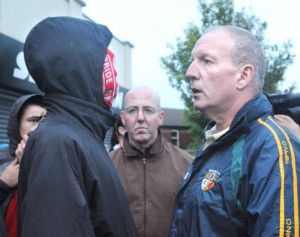
Scrivendo nel giornale repubblicano An Phoblacht, Bobby Storey fa domande dirette ai gruppi di dissidenti, tra cui la Real IRA.
Storey stava scrivendo prima delle violenze esplose in alcune parti di Belfast questa settimana, molte delle quali è stata attribuita a elementi dissidenti . “Chi sta tirando le corde?” chiede – paventando le infiltrazioni da parte dei servizi di sicurezza.
“A quale genere di interesse servono le azioni di questi gruppi (dissidenti)?”, scrive Storey.
Il repubblicano di Belfast era collegato da elementi di alto livello della sicurezza ad alcuni “spettacolari” attacchi dell’IRA, ed è stato ritenuto il direttore dell’intelligence dell’organizzazione.
Lo Special Branch ritiene che Storey abbia architettato il furto presso i suoi uffici a Castlereagh nel marzo 2002, quando documenti altamente sensibili di intelligence furono rubati.
Fu la violazione della sicurezza più imbarazzante in un conflitto decennale.
“Bobby è stato l’uomo che l’ha istigata e l’ha eseguita”, disse una fonte dello Special Branch all’epoca.
La fonte ha descritto il furto come “Storey MO ( modus operandi )”, aggiungendo: “l’IRA ha i documenti”.
Allora il repubblicano di West Belfast venne arrestao, ma rilasciato senza accuse. Ora, dopo la fine formale della campagna armata dell’IRA, Storey è uno delle personalità di alto livello che adesso ricoprono un ruolo politico come presidente dello Sinn Fein per Belfast.
In An Phoblacht ha scritto: “L’IRA ha svolto una efficace e sostenuta campagna militare contro le forze britanniche, con il sostegno attivo della comunità repubblicana – con un gran numero di volontari disciplinati e un livello di sostegno internazionale e finanziario che non verrà ottenuto prossimamente nelle circostanze attuali.
“Come può quindi un gruppo militare molto più piccolo, senza la forza, la competenza, disciplina e sostegno dell’ IRA ottenere più di quanto ottenuto dall’IRA ?
“Questi gruppi devono capire che non vi è alcuna possibilità di riportare un numero significativo di persone nel conflitto”, scrive.
L’attività dissidente – compresi gli attacchi al palazzo di giustizia a Newry, a Palace Barracks e alla base PSNI di Newtownhamilton – è stata al massimo livello per più di un decennio, dal quando fu realizzata la campagna con le bombe che sancì la nascita della Real IRA nel 1998.
Ma Storey ritiene che questi attacchi non otterranno nulla.
“Questi gruppi ammettono apertamente di non avere la possibilità di raggiungere la fine della Partition (Partizione, divisione dell’Irlanda in due entità diverse) con le loro azioni armate”, scrive .
“Il loro obiettivo dichiarato è quello di evitare la «normalizzazione» delle Sei Contee. In altre parole, puntano apertamente ad una nuova militarizzazione – per la repressione , per la chiusura dello spazio democratico e per porre fine al processo di trasformazione della PSNI – in modo che un numero leggermente più ampio di persone saranno trascinate nelle attività armate, con tutti i suoi costi.
“E poi che cosa?” ha chiesto.
“A questa domanda non hanno risposta. Questa non è una giustificazione per qualsiasi perdita di vite, e per la distruzione di altre vite dovuta all’imprigionamento .
“E’ un prezzo enorme da pagare per un tale piccolo obiettivo a vicolo cieco “.
IRA icon Storey squares up to ‘road to nowhere’ dissidents
Writing in relaunched republican newspaper An Phoblacht, Bobby Storey puts a number of direct questions to dissident groups, including the Real IRA.
Storey was writing before the widespread eruption of violence in parts of Belfast this week, much of which has been blamed on dissident elements. “Who is pulling your strings?” he asks — inferring security services infiltration.
“Whose interest are the actions of these (dissident) groups serving?” he writes.
The Belfast republican was linked by senior security sources to a number of the IRA’s so-called “spectacular” attacks, and was believed to be the organisation’s director of intelligence.
Special Branch believes he masterminded the burglary at its offices at Castlereagh in March 2002, when highly sensitive intelligence documents were stolen.
It was the most embarrassing security breach in a decades-long conflict.
“Bobby was the man who instigated it and brought it about,” a Special Branch source said at the time.
The source described the break-in as “Storey’s MO (modus operandi)”, adding: “The IRA has the documents.”
At the time the west Belfast republican was arrested, but released without charge. Now, after the formal ending of the IRA armed campaign, he is one of a number of senior figures to have stepped into a political role as Sinn Fein’s Belfast chairman.
In An Phoblacht, he writes: “The IRA carried out an effective, sustained military campaign against British forces with the active support of republican communities — with large numbers of disciplined volunteers and a level of international support and financial backing that will not be forthcoming in today’s circumstances.
“So how is a much smaller military force, lacking the strength, skills, discipline and support the IRA had, going to achieve more than the IRA?
“These groups need to understand that there is zero chance of drawing significant numbers of people back into conflict,” he writes.
Dissident activity — including the attacks on Newry courthouse, Palace Barracks and Newtownhamilton PSNI base — has been at its highest level for more than a decade, since the bombing campaign which marked the emergence of the Real IRA in 1998.
But Storey believes these attacks will achieve nothing.
“These groups openly admit that they have no chance of achieving an end to Partition by their armed actions,” he writes.
“Their stated goal is to ‘prevent normalisation’ in the six counties. In other words, they are openly aiming for remilitarisation — for repression, for the closure of democratic space and for an end to the process of transforming the PSNI — so that a slightly broader number of people will be drawn into armed activity with all of its associated costs.
“And then what?” he asked.
“To this question they have no answer. This is no justification for any loss of life, and for the destruction of other lives through imprisonment.
“It is a huge price to be paid for such a narrow, dead-end goal.”